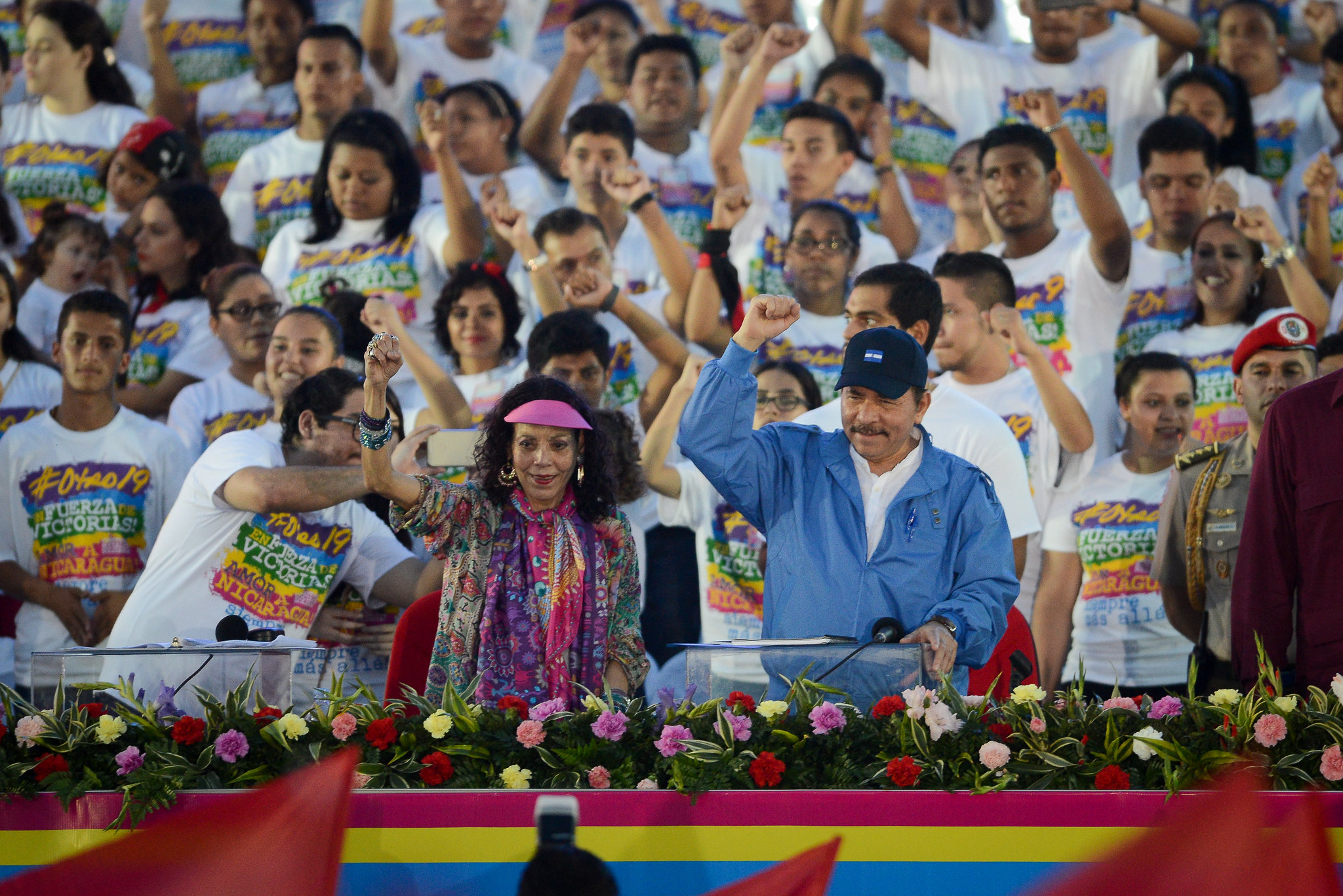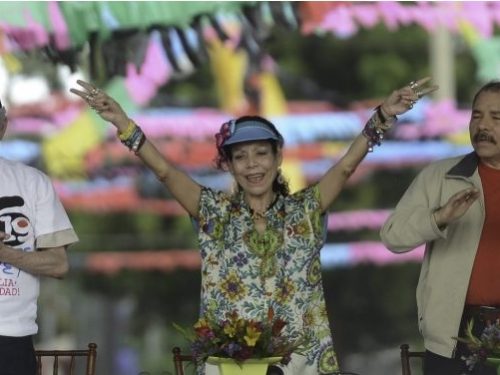
In the last two weeks, the government of Nicaragua arrested at least 16 opponents of Daniel Ortega and Rosario Murillo’s regime, under the protection of a set of laws approved at the end of 2020 that make any type of protest against the State a crime. The escalation of violence is taking place as the general elections on November 7th approach, when the president will run for his fourth consecutive term.
The Voice of Guanacaste interviewed Nicaraguan political analysts and relatives of those persecuted in order to understand why the neighboring country is imprisoning the opposition and what is behind the most recent events.
1. Why are political opponents being arrested in Nicaragua?
In the last quarter of 2020, the National Assembly, the legislative body in the country of Nicaragua, approved a set of laws that authorities have applied to imprison opponents during the current year.
This operation, called “Operation Danto 21” by the Ortega government, is focused on raiding and apprehending known opponents for “betraying the Homeland.” This criteria comes from the Law for the Defense of the Rights of the People to Independence, Sovereignty and Self-determination for Peace (or Law 1055), approved in December of 2020.
This law classifies all those who “promote terrorist acts” and “praise or applaud sanctions against the State of Nicaragua and its citizens” as “traitors to the homeland” or “participants in a coup” and imposes a penalty of imprisonment. Those who break this law will not be able to run for popularly elected positions and may face a sentence of up to 20 years in prison.
They also approved the Law for the Regulation of Foreign Agents, which requires that organizations that receive “foreign funds” must submit to the State detailed reports on how they will receive and use the funds. The Ministry of the Interior, part of the executive branch, will divide them into “real” and “foreign agents.”
Those who are classified as “foreign agents” will not only not be able to participate in Nicaraguan political activities, but the government will also be able to confiscate all their assets and sentence them to up to 5 years in prison.
Since Ortega returned to power in 2007, he only finances projects of entities that don’t criticize his government. Since then, non-profit organizations (such as feminist, environmental or artistic groups), the media, foundations and even individuals have to find other sources of income to sustain themselves, through scholarships and foreign funds. This law is an attempt to financially suffocate people and organizations that survive from this.
Another piece of legislation approved in October 2020 is the Special Cybercrime Law, which condemns anyone who spreads “false news,” designated as such at the discretion of the authorities, in the media or on social networks with up to ten years in prison.
2. Who did the Ortega government arrest?
Among the list of people arrested are potential presidential candidates (Arturo Cruz, Felix Maradiaga and Juan Sebastian Chamorro), activists belonging to opposition groups (Suyen Barahona, Violeta Granera, Ana Margarita Vijil, Tamara Davila, Jose Pallais), businessmen (Jose Adan Aguerri, Luis Rivas Anduray) and former Sandinista guerrillas. These last few fought alongside Ortega and Rosario Murillo during the Sandinista Revolution in Nicaragua in the 1970s.
Based on the Foreign Agents Law, the Nicaraguan police also arrested citizens Marcos Fletes and Walter Gomez, along with potential candidate Cristiana Chamorro, due to an alleged case of laundering money, property and assets through the defunct Violeta Barrios de Chamorro Foundation.
In addition, the Attorney General’s Office used the Cybercrime Law to threaten at least three journalists with prison.
3. Who are the players behind the arrests?
Currently, of the 92 legislators in the National Assembly, 71 are from the Sandinista party (77%), so any law that comes from the government is approved in a matter of days by the party-liner legislators. The package of laws being used to repress opposition was approved in less than six months, without allowing participation from the 21 legislators from opposing parties.
The Judicial Power, controlled by Sandinista judges, is in charge of enforcing the laws approved by the Assembly, carrying out investigations of opponents and ordering arrests. The National Police carries out the raids and arrests (the police force is currently led by Francisco Diaz, who has family ties to the Ortega-Murillos and is one of the people closest to power). Many times, searches and arrests happen before a judge issues the warrant.
Nicaraguan political scientist and former legislator Edipcia Dubon affirmed that although the institutions carry out these procedures, all of the orders come “from above.” In other words, both the police and the courts act following the orders of Ortega and Murillo.
They always wait for orders. They don’t act individually or with separation of powers,” explained the expert.
4. Are the arrests legal?
The Ortega government imprisoned the opponents under the protection of the laws that the National Assembly in Nicaragua approved, so the arrests are legal in that country.
The Organization of American States (OAS), the Inter-American Commission on Human Rights (IACHR) and the European Union (EU) have all described the package of laws as a “violation of human rights.” In the last 15 days, these international organizations have demanded the release of all political prisoners, the repeal of the package of laws and that Ortega provide a suitable space for holding free, democratic and fair elections in Nicaragua.
The Secretary General of the OAS, Luis Almagro, described the people arrested as “political prisoners of the State of Nicaragua.”
Article 23 of the American Convention on Human Rights (ACHR) specifies that the American states must guarantee that their inhabitants can exercise the right to aspire to political positions. So Ortega and Murillo would be in breach of international treaties.
The IACHR affirmed that the laws on sovereignty, cybercrime and foreign agents are part of a strategy to “increase the repression of dissident voices in the country.” The entity described the wording of the three laws as “too broad,” “imprecise” and “lacking effective procedures to know when to use them.”
5. Why did the violence increase?
Edipcia Dubon emphasized that although the violence is more “visual” now, it really began in 2018, when protests against the Ortega government broke out, and it hasn’t stopped since then.
In 2018, the Ortega-Murillo government violently suppressed several group protests that were held, initially, in rejection of a reform of Nicaragua’s Social Security. According to the IACHR, at that time, the state killed at least 250 protesters, imprisoned about 350 people and sent almost 80,000 Nicaraguans into exile.
In addition to the 16 most recent arrests, there are at least 110 other people behind bars for political reasons in Nicaragua, according to the Mechanism for the Recognition of Political Prisoners of that country. At least 20 of them have been in prison for three years.
The violence also translates into persecution of the relatives of people killed in protest; it’s in the creation of repressive laws, in the persecution of opponents in their homes, in sending people into exile. That isn’t seen on the news, but it happens every day,” explained Dubon, who currently lives in Costa Rica.
Josefina Davila, a relative representing political prisoner Tamara Davila, affirmed that her family lived under constant harassment by members of the National Police and by Sandinista parapolice agents who came to their house to watch their movements.
The harassment got to the point where Tamara couldn’t go out with her daughter because she was afraid something would happen to them,” she said.
According to her sister, Tamara, who is also a feminist and part of the rival political party Unidad Nacional (National Unity), she couldn’t do any normal activity without being questioned or followed by an officer. When she was arrested at her residence, her five-year-old daughter was present.
Juan Sebastian Chamorro and Felix Maradiaga experienced the same thing. Before their arrest, they openly denounced the persecution they suffered from the police and the military. Maradiaga returned from exile in 2019, after being out of the country for a year for fear of an attempt on his life.
6. What condition are the prisoners in?
Nobody knows. Since the arrest and search of their respective homes, no family member has heard any news of them. The government hasn’t reported their condition either, and at the Legal Aid Directorate— the prison where relatives assume they are— they don’t give them any answer.
The Nicaraguan judiciary hasn’t allowed family members to send any solid food, personal hygiene products or medicine to those arrested either.
According to testimonies from people who witnessed the arrest of Dora Maria Tellez and Ana Margarita Vigil, both were beaten by anti-riot police prior to their arrest. However, their relatives haven’t been able to verify that.
People with health problems are imprisoned there, people who may have gotten sick from the violence with which they were taken captive and they don’t tell us anything,” emphasized Josefina Davila.
Davila stated that until she has a photo or some type of contact with her sister, Tamara, she won’t consider her to be a prisoner, but rather a person disappeared by the State. Although Josefina said that none of the people present during the search of Tamara’s house saw when she was arrested and taken away, the National Police confirmed in a statement that the young woman was imprisoned.
Anticipating a situation like this, several of those arrested had gotten lawyers. However, the judiciary hasn’t allowed any of the defense attorneys to be involved in the process.
7. What is Costa Rica’s position on the arrests?
On June 9, a day after the arrest of activist and opposition candidate Felix Maradiga, the Chancellor’s Office issued a statement reiterating “the inexcusable obligation to respect the human rights of the different political players.”
A week later, on June 15, Costa Rica voted in favor of a resolution within the OAS Permanent Council, which requires the State of Nicaragua to release people arrested for political reasons.
The Legislative Assembly also condemned “the latest illegal actions of the government of Daniel Ortega Saavedra” through a motion approved by 40 of the legislators, referring to the imprisonments and threats against the press. In addition, the legislators issued a message of “solidarity with the Nicaraguan people.”







Comments